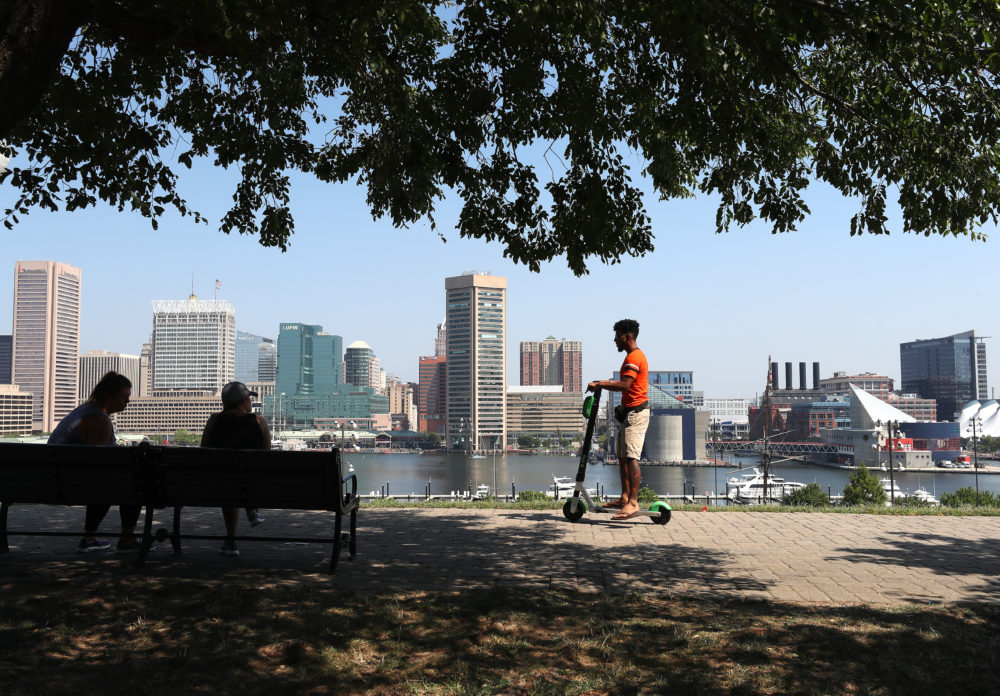Advertisement
What Baltimoreans Think About President Trump's Attacks On Their City

With Meghna Chakrabarti
We know what President Trump thinks about Baltimore, but how do the people who live there see their city? We’re listening to Baltimore.
Guest
Kaye Whitehead, professor of communication and African and African American Studies at Loyola University Maryland. Founding executive director of The Emilie Frances Davis Center for Education, Research and Culture. Host of "Today With Dr. Kaye." Three-time New York Emmy-nominated documentary filmmaker. (@kayewhitehead)
From The Reading List
CityLab: "Opinion: In Trump vs. Baltimore, No One Is Winning" — "Over the weekend, President Trump took to Twitter, repeatedly, to attack Congressman Elijah Cummings and the predominantly black district of Baltimore City that he represents. He described Maryland’s 'rat and rodent infested' 7th District as a 'very dangerous & filthy place' and declared that 'no human being would want to live there.'
"In a way, there was nothing new in this latest outburst: It comes fast on the heels of him telling four freshman congresswomen of color, all Americans, that they should, 'go back and help fix the totally broken and crime infested places' from whence they came. Since his emergence on the national political stage, he has used his bully pulpit to attack and denigrate women, people of color, immigrants, Muslims, and those with disabilities. Trump has deployed a variety of well-worn racist tropes to describe black and brown politicians and cities, communities, and countries. His racialized rhetoric harkens back to a time of slavery and Jim Crow, and to the deeply rooted belief that America is a land that belongs only to white people.
"It is relentless, and it is exhausting. Even though it is clear that Trump uses these attacks as a distraction from the investigations and impeachment threats that are closing in around this administration, we can’t look away.
"Here in Baltimore, we were forced to defend ourselves. Locals launched the hashtag #WeAreBaltimore, urging others to share photographs and stories about our tourist attractions, our neighborhoods, and our community activists and musicians. What started off as repudiation of Trump quickly became an open love letter to the world about our city."
Advertisement
Washington Post: "Opinion: Trump was wrong to attack Cummings, but right about Baltimore" — "President Trump was wrong to personally attack Rep. Elijah E. Cummings (D.-Md), a man widely respected by both Democrats and Republicans alike. But Trump was absolutely right when he called Baltimore 'dangerous,' 'filthy' and 'rodent infested' — that is, if you can believe what you read in the 'failing New York Times.' "
In March, the Times Sunday magazine published a heart-rending story entitled 'The Tragedy of Baltimore,' which chronicled the precipitous decline of the city. It described how then-Mayor Catherine Pugh (D) toured the Highlandtown section of southeast Baltimore, as community leaders showed her a block where prostitutes gathered, piles of uncollected garbage and a liquor store that allowed drunks to congregate while pretending to wait for the bus. '"Watch your step," someone called out as the group neared a dead rat,' the Times reported.
"The city’s 'regression has been swift and demoralizing,' the Times wrote, adding that officials have 'struggled to respond to the rise in disorder, leaving residents with the unsettling feeling that there was no one in charge.' One resident contrasted the tourist-friendly Inner Harbor with her West Baltimore neighborhood, where, she said, 'we’re all bolted in our homes, we’re locked down.' "
New York Times Magazine: "The Tragedy of Baltimore" — "In Baltimore, you can tell a lot about the politics of the person you’re talking with by the word he or she uses to describe the events of April 27, 2015. Some people, and most media outlets, call them the 'riots'; some the 'unrest.' [Shantay] Guy was among those who always referred to them as the 'uprising,' a word that connoted something justifiable and positive: the first step, however tumultuous, toward a freer and fairer city. Policing in Baltimore, Guy and many other residents believed, was broken, with officers serving as an occupying army in enemy territory — harassing African-American residents without cause, breeding distrust and hostility.
"In 2016, the United States Department of Justice’s Civil Rights Division concurred, releasing a report accusing the city’s Police Department of racial discrimination and excessive force. The city agreed to a 'consent decree' with the federal government, a set of policing reforms that would be enforced by a federal judge. When an independent monitoring team was selected to oversee the decree, Guy was hired as its community liaison. This was where she wanted to be: at the forefront of the effort to make her city a better place.
"But in the years that followed, Baltimore, by most standards, became a worse place. In 2017, it recorded 342 murders — its highest per-capita rate ever, more than double Chicago’s, far higher than any other city of 500,000 or more residents and, astonishingly, a larger absolute number of killings than in New York, a city 14 times as populous. Other elected officials, from the governor to the mayor to the state’s attorney, struggled to respond to the rise in disorder, leaving residents with the unsettling feeling that there was no one in charge. With every passing year, it was getting harder to see what gains, exactly, were delivered by the uprising."
Grace Tatter produced this segment for broadcast.
This segment aired on August 1, 2019.